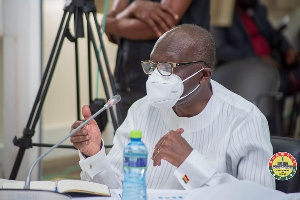Finance Minister-designate, Ken Ofori-Atta The banking sector cleanup that was undertaken by the government of Ghana did not target any individuals, Finance Minister-designate Ken Ofori-Atta has said.
According to him, it was done without malice and in good faith.
Some nine local banks, 23 savings & loans companies, 347 microfinance institutions, 39 finance houses and 53 fund management companies went under as a result of the cleanup exercise.
An asset quality review carried out by the BoG in 2015 and 2016 revealed severe challenges with solvency, liquidity and asset quality in Ghana’s banking industry, with some banks showing significant under-provisioning and capital shortfalls.
When the current management of the BoG took office in early 2017, it faced a financial sector it describes as being in a “considerable state of distress”.
In response, the authority moved to strengthen the sector in September 2017 with a new minimum capital requirement, in which all universal banks were required to increase their minimum paid-up capital to GHS400 million ($77.5m) by December 31, 2018.
The result of this regulatory intervention was a number of market exits and mergers, leading to a significantly altered banking landscape.
By 2019, the licences of nine banks had been removed by the BoG on the grounds of insolvency.
The central bank also gave its approval for three mergers: First Atlantic Merchant Bank with Energy Commercial Bank; Omni Bank with Sahel Sahara Bank; and First National Bank with GHL Bank.
Some 16 banks had met the new capital requirement, mainly by securing capital injections or through the capitalisation of surplus income.
Five banks secured cash injections from the Ghana Amalgamated Trust (GAT), a group of private pension funds.The government is also using resources from GAT to recapitalise two state-owned banks, the Agricultural Development Bank and the National Investment Bank.The latter is being restructured through governance and management reforms, and its business model refocused to support the government’s industrialisation policies.Both institutions, therefore, are expected to play important roles in the realisation of the government’s economic strategy.The final outcome of the BoG’s recapitalisation process is an industry made up of a smaller number of well-capitalised banks.“Following the exercise, all the key financial soundness indicators in terms of solvency, liquidity, efficiency and asset quality have improved. The provision of capital buffers by banks under the Basel II and Basel III framework has also ensured that banks are more resilient to shocks,” Dr Ernest Addison, governor of the BoG, told OBG.“Other supervisory and regulatory […]
